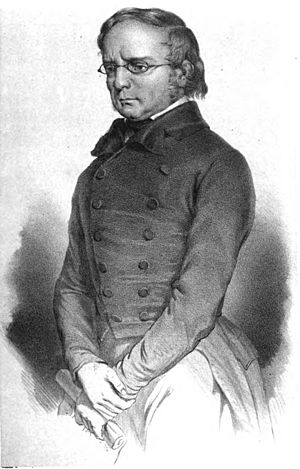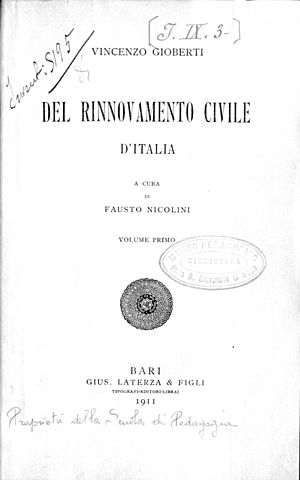Vincenzo Gioberti facts for kids
Quick facts for kids
Vincenzo Gioberti
|
|
|---|---|
 |
|
| Prime Minister of Sardinia | |
| In office 16 December 1848 – 21 February 1849 |
|
| Monarch | Charles Albert |
| Preceded by | Ettore Perrone di San Martino |
| Succeeded by | Agostino Chiodo |
| Personal details | |
| Born | 5 April 1801 Turin, Kingdom of Sardinia |
| Died | 26 October 1852 (aged 51) Paris, Second French Empire |
| Nationality | Sardinian |
| Political party | Moderate Party |
| Occupation | Priest, philosopher, politician |
Vincenzo Gioberti (born April 5, 1801 – died October 26, 1852) was an Italian priest, thinker, and politician. He was the Prime Minister of Sardinia from 1848 to 1849. He was also a strong supporter of liberal Catholicism, which blended Catholic faith with liberal ideas.
Contents
Life Story of Vincenzo Gioberti
Early Life and Education
Vincenzo Gioberti was born in Turin, Italy. He lost his parents when he was very young. At 16, he joined the clerics of the court. He studied theology at the University of Turin and earned his doctorate degree there.
He was trained to become a priest and was ordained in 1825. In 1828, he traveled through Lombardy. There he became friends with the famous writer Alessandro Manzoni.
Becoming a Voice for Italian Freedom
Gioberti was greatly influenced by Giuseppe Mazzini. He became dedicated to making Italy free. This meant freedom from foreign rulers. It also meant freedom from ideas that were not truly Italian. He believed Italy's power in Europe was linked to the Pope's leadership. This idea shaped most of his writings. It also guided his political views.
Challenges and Exile
The king, Charles Albert, noticed Gioberti. He made him one of his chaplains. However, Gioberti was not part of the king's inner circle. His popularity made the court party suspicious. They could not fully trust him.
Knowing this, he resigned from his job in 1833. But he was suddenly arrested. He was accused of being part of a secret plan. He was held in prison for four months. After that, he was sent away from Italy without a trial.
Gioberti first went to Paris. A year later, he moved to Brussels. He stayed there until 1845. In Brussels, he taught philosophy. He also helped a friend run a private school. During this time, he wrote many important books. These books often focused on Italy and its place in the world.
Return to Italy and Political Role
In 1841, Gioberti published his book "Del Buono." The Grand Duke of Tuscany offered him a teaching job. This was at the University of Pisa. But King Charles Albert did not approve. So the offer was canceled.
Gioberti became famous in Italy in 1843. This was when he published "Del primato morale e civile degli Italiani." He dedicated this book to Silvio Pellico. In it, he talked about the greatness of ancient Rome. He also wrote about the glories of the papacy. He explained how much science and art owed to Italian genius. He said that Italians were a model for all nations. Their weakness at the time was due to political issues. To fix this, he suggested uniting all Italian states. He proposed the Pope as their leader.
King Charles Albert announced a general pardon in 1846. Gioberti, who was in Paris, could return to Italy. But he waited until late 1847. When he arrived in Turin on April 29, 1848, people welcomed him with great excitement.
He refused to become a senator. Instead, he chose to represent his hometown in the Chamber of Deputies. He was soon elected president of this group. Later that year, a new government was formed. Gioberti became its head.
Later Life and Legacy
When Victor Emmanuel became king in March 1849, Gioberti's active political life ended. For a short time, he was part of the government without a specific role. Soon, they had a major disagreement. To remove him from Turin, he was sent on a mission to Paris. He never returned to Italy.
In Paris, he refused a pension and any church positions. He lived simply. He spent his days and nights writing, just as he had in Brussels. He died suddenly on October 26, 1852.
Gioberti's Ideas and Writings
Gioberti's writings are very important. They are perhaps even more important than his political career. His ideas are unique in European philosophy.
He believed that God is the only true being. Everything else just exists because God created it. He thought that human knowledge comes from God. This knowledge is seen directly by our minds. But to use it, we need to think about it and use language.
Key Works and Their Impact
Gioberti saw religion and civilization as connected. In his book Del primato morale e civile degli Italiani, he argued that the Church is central to human well-being. He believed Italy should be supreme. This would happen by restoring the Pope's moral leadership. This leadership would be based on religion and public opinion.
His first book, La Teorica del sovrannaturale (1838), was written to help a friend. This friend had doubts about faith and life after death. After this, he wrote many other philosophical books. His Introduzione allo studio della filosofia (1839–1840) explained his new ideas. He argued that religion is a direct expression of truth. He also said it is one with true civilization.
He also wrote essays on popular topics like Del bello (On Beauty) and Del buono (On Goodness). These were published in 1846. His book Il Gesuita moderno strongly criticized the Jesuits. This book likely helped shift power from the Church to civil leaders. The popularity of these political writings led to his enthusiastic welcome back in Italy. These works were seen as proper and helped liberal clergy join the movement to unite Italy.
Later Views and Challenges
After the failed revolutions of 1848, Gioberti published Il Rinnovamento civile d’Italia. In this book, he sharply criticized the Jesuits. He also criticized Italy's strict clergy and Piedmont's hesitant monarchy.
Despite this, some of Gioberti's early hopeful ideas lived on. They influenced liberal nobles and Catholic thinkers. These people later supported the goal of a united Italy under Piedmont's liberal monarchy.
However, the Jesuits became even closer to the Pope after he returned to Rome. In the end, Gioberti's writings were placed on the Index. This meant Catholics were not allowed to read them. His later works, like La Filosofia della Rivelazione, show his more developed ideas.
See also
 In Spanish: Vincenzo Gioberti para niños
In Spanish: Vincenzo Gioberti para niños
 | Calvin Brent |
 | Walter T. Bailey |
 | Martha Cassell Thompson |
 | Alberta Jeannette Cassell |


